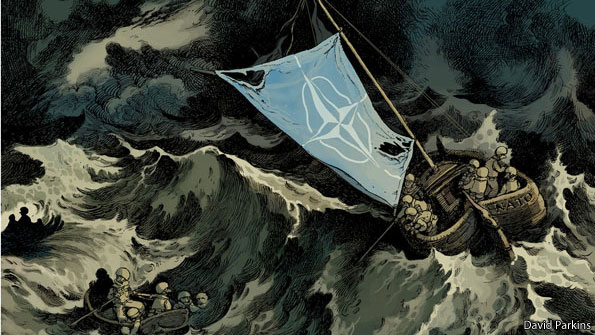
From James Stavridis, Allied Command Operations: In late April, I’ll travel to Berlin to give one of the final speeches of my four years as the Supreme Allied Commander for NATO’s global operations. In what will be a bit of a valedictory address, I shall talk about the challenges the Alliance faces in the time ahead — there are many. I’ll also offer some thoughts and solutions that I hope will be helpful to my successor and the team that will continue the voyage at NATO headquarters.
First, as to the challenges:
– Cyber – Top of my list. Here we see the greatest mismatch between the level of potential threat and our preparation for it. While the 28 NATO nations collectively have enormous skill and capability in this area, we have yet to find ways to work together, largely due to national caveats and concerns about sharing such sensitive technology, intelligence, and knowledge.
– Proliferation – I worry greatly about the leakage of weapons of mass destruction from various rogue states like Syria, Iran, and North Korea. Associated with this is the ability to deliver such weapons using ballistic missiles — a technology that is likewise proliferating rapidly. The current situation in Syria, of course, is the most immediately worrisome.
– Trafficking – Related to proliferation, yet encompassing not only weapons of mass destruction, but also humans (as in slavery and human smuggling for profit), conventional weapons, currency, narcotics, and illegal migrants. By some estimates, these various "business ventures" account for 5% of the world’s GDP, or something in the range of $5 Trillion. The effect goes far beyond the criminality — profits finance terrorism, create corrupt criminal states, and undermine fragile democracies.
– Piracy – While we are making gains (especially on the east coast of Africa), this will continue to be a multi-billion dollar discontinuity in the global transportation system.
– Fragile States — Afghanistan, Mali and Syria are obvious, and NATO interests are engaged in each. Additionally, there are other very fragile security situations in North Africa, the Levant, and central Asia that have the potential to require security operations at some point.
– Financial Crunch – Austerity and the effect of defence budgets. NATO GDP % defence spending remained at 1.6% average in 2012, same as 2011, down from 1.8% in 2010 and 1.9% in 2009.
– Black Swans – What are we disregarding, because it seems too low a probability, but could have enormous consequence? I’d nominate a bird flu pandemic, which, if large enough, could have massive security consequences. . . .
Excerpt from "The Future of European Defence" by Admiral James Stavridis, Supreme Allied Commander, Europe; Commander, US European Command. (graphic: David Parkins/Economist)
Image: economist%204%2022%2013%20NATO%20troubles_0.jpg
